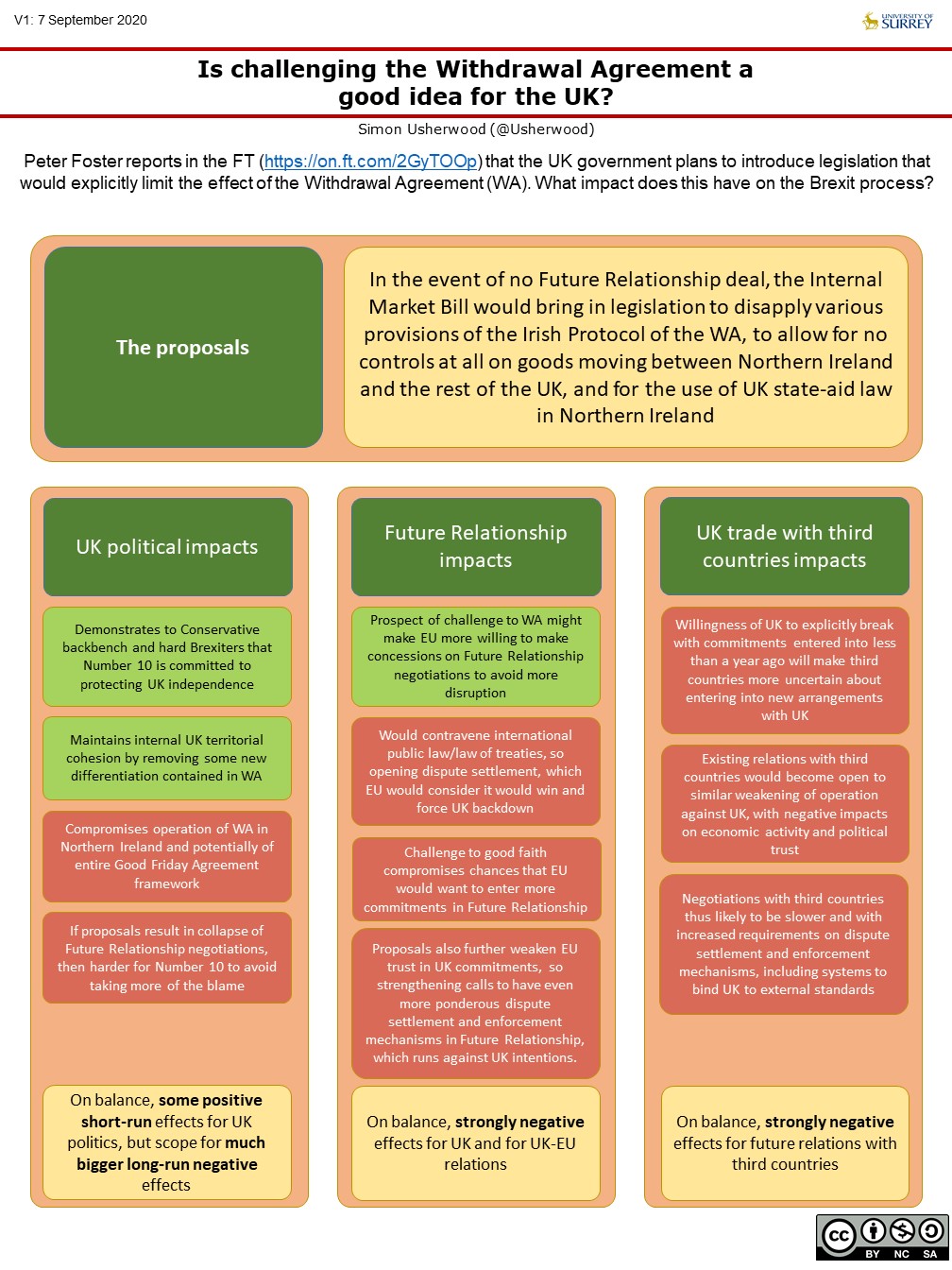As I’ve sat down to write this, I’ve just reminded myself that I said only a short time ago that a leading indicator of heading to an agreement on the Future Relationship would be a de-escalation of the rhetoric.
Make of that what you will, both in regard to Brexit and to me.
This past week has been an absolute bloodbath for diplomatic niceties and for any rational modelling of the negotiations. The rolling breaking news on the language of the Internal Market Bill – which turned out to be even worse than expected – was joined by the non-announcement of a UK state aid policy to produce something that looks very like a de facto statement of non-engagement with the Future Relationship talks by the UK.
As I noted on Monday, there are vanishingly small upsides to the IM Bill move, as summarised here:

It’s not only bad for the negotiations, but also for the UK reputation in current and future negotiations with other parties, which runs against any plans for ‘Global Britain’.
I’m hardly the only one to note all this, but it does then raise the question of why do it?
As with the extension debate, asking why people aren’t acting in their own apparent best interests is important, mainly because it suggests you’ve not understood their perception of their interests.
In this case, there really only three options available to explain this diplomatic equivalent of taking a leak on the head of the other side: rupture; bigifying; and ignorance.
The Rupture view is simply that this is the end of the Future Relationship and of pretty much any preferential relationship with the EU. The UK is setting its own course, and burning the one bridge it has left in place, the Northern Ireland Protocol. Consequences be damned, it’s off.
This counts on a degree of no-one else minding too much, possibly because of the excellent trading opportunities that would be on offer with the UK (seventh-largest, etc, etc) and possibly because this move might make the EU throw a complete strop, so allowing the UK to foist the blame on to them for not engaging.
Stuff of Telegraph editorials this might be, but it also doesn’t stack up. Most obviously, if you don’t care about any of this, then why only serve up a very precise dis-application of the protocol? As the ERG note, the IM Bill doesn’t go far enough in that regard.
More generally, the UK isn’t notifying formally that it’s stopping negotiations and is accepting the emergency meeting of the Joint Committee today; hardly moves to bolster a ‘we’re off’ approach.
Even the softer version of this – make it so the EU throw in the towel – doesn’t really stand up, given the technical progress that’s been reported up to very recently on both protocol implementation and the FR negotiations.
So perhaps it’s bigifying: kicking up some dust to show how tough the UK government is?
This has two elements: domestically, it reaffirms Number 10’s credentials as delivering a proper Brexit to backbenchers, while in negotiations it shows the UK is serious about walking away if it doesn’t get what it wants.
The general consensus has been that the EU arm of this is a busted flush: the EU long ago calculated that the costs of non-agreement would fall very much more heavily on the UK than themselves, so while everyone would lose from failed to reach a deal, that would be much more London’s problem.
Walking away from a negotiation is only credible and effective if the other side think you’ve got a better alternative and/or if they themselves have no viable alternative but to keep you in. Neither applies here.
But the domestic aspect does have legs. Remember these backbenchers might well have to ratify a Future Relationship deal in short-order this autumn, so maybe flashing your teeth and then claiming to have beaten the EU down to a world-beating deal might be worth it.
This I have more time for, not least since it’s what Johnson did last autumn with the same Withdrawal Agreement his spokesman is now claiming he negotiated too quickly. Add in the self-denying decision not to extend transition and you have a recipe for needing to make sure you don’t lose control of your party at all.
Of course, as the ERG move shows, the problem with teeth-flashing is that it makes people hungry, especially if you then claim you have extracted something with it: why not do more?
Ratification is going to be very awkward for all involved. Johnson needs his own party to comply, because opposition parties are likely to take the view that since even the intended Future Relationship is going to come with disruption, they won’t want to get it over the line, because Johnson will then blame them for it. So Tory rebels might only need to deprive the government of its majority to stymie the ratification Bill, and with so little time even a small delay might be enough to crash the bus for 31 December.
So the possible gain of this week on this front is already in doubt.
Which leaves ignorance.
Again, as a general rule, I dislike this as an explanation, since everyone’s got enough sense to know what’s what. The protocol’s effects on state aid were clear during negotiation and the entire time since, and the Johnson government was always clear about disconnecting state aid during the current talks, so if we might channel our inner Theresa Mays: nothing has changed.
Yes, there might be a feel that all this reads like someone finally joining the dots, but even then it’s a remarkable antagonistic way of resolving it, as evidenced by the departure of Jonathan Jones showed.
Which brings us back to bigifying and all the issues which that comes with.
